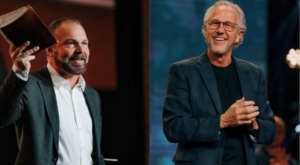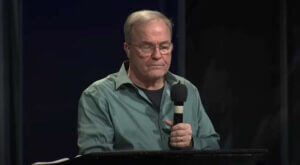There are a lot of ways to do succession poorly, Andy Croft says. The church has plenty of bad examples in its history. But Croft is encouraged by both the mentors in his life and how he sees the Holy Spirit stirring in the next generation. Through the power of relationship—with one another and with God—Croft believes the church has a bright future ahead.
Croft is the joint senior pastor at Soul Survivor Watford in the United Kingdom, co-pastoring with Mike Pilavachi, who founded the ministry when Croft was just a child. In an interview with Charisma, Croft shared his own testimony of coming to faith in Christ, his relationship with Pilavachi and what he’s learned through years of ministry, mentoring and chasing after the Lord.
This interview—originally recorded for our “New Year, New Voices” podcast series—has been edited for length and clarity. Listen to the full interview here.
Berglund: Can you share your testimony?
Croft: I grew up in a Christian home, and I went to a little Anglican Church in the northeast of England, and I just drifted away really from Christianity when I became a teenager. It just didn’t seem massively relevant to me.
And then when I was about 16 years old, I started getting dragged along to Christian youth events by this very persistent friend of mine who I didn’t want to say no to after the 15th time he asked me. So, I ended up going along and, you know, just became a Christian—but not in one lightbulb moment.
C.S. Lewis sometimes talks about, when people make that moment of conversion, sometimes it’s like interrailing between different countries in Europe. You’re on the train when you cross between France and Germany, and you know exactly when it happens because you see the border. But other times, he says, it’s like you’re asleep on the train, and you wake up in Germany, and you notice all these trees look a bit more German, and there’s a lot more beer and a lot less wine, and you think, “Oh, I must be in Germany!” And for me, it was that.
Gradually, the gospel kind of seeped into me, and the real moment where I began to think I think I’ve actually become a Christian was when I started to seriously change some of my lifestyle and live for Jesus.
A little while after that, a friend of mine dragged me to a Christian camp where I ended up meeting Mike Pilavachi, who leads Soul Survivor and led it at the time, and he just had a word of knowledge for me in a dinner queue when I was queuing up for a burger. I had no idea who he was, and really, from there, I ended up becoming an intern and traveling around the world with him and doing a year in Watford, and really from there, I never left. And now we lead the church together.
Berglund: Some of our readers may never go to the U.K. and see Soul Survivor Watford in person. Can you describe a little bit for them? What’s it like?
Croft: It’s a church plant that Mike started 27 years ago. The vision behind it was to reach unchurched young people in Watford, which is a town just north of London. When we started, Matt Redman—who’s a well-known worship leader now—was in Mike’s youth group. They started with about 10 other people, and they started a cafe for young people, inviting those from the local schools to come. And they started to turn up.
After a little while, they started to turn up on a Sunday as well, and they became Christians. 27 years later, they’ve grown up and had kids, and we had to start a morning service. So, it’s a church that meets in a warehouse. We’re part of the Anglican Church, but it’s not particularly conventional. You wouldn’t know that we’re Anglican, I think, if you just walked into the building. We’re now a church of about 1,200, meeting in four services on a Sunday, with a lot of young people in their 20s and 30s and a lot of young families.
Berglund: In the charismatic movement, a lot of people who came in during the Jesus movement in the ’70s and the ’80s are now starting to pass the torch to the next generation. I think you and Mike co-leading creates a really interesting picture of that. What’s been your experience taking on the responsibility for a ministry that’s been around about as long as you have?
Croft: You know what? It’s been terrifying. But also, because Mike and I do it together, it’s very safe as well at the same time. I think, with succession and things like that, there’s always so much potential for it to go wrong, and there are so many bad examples of it.
The way that Mike and I do it is we do it as friends. And we really are friends. He and I are involved in each other’s lives to a ridiculous extent. He feeds my children stupid amounts of chocolate, and we chat every single day. We prefer each other, and we submit to each other. And that’s one of the reasons why it works very well in terms of the dynamic that we have here in Watford.
But the other thing that’s a big part of it is, you know, Paul talks about how his relationship with Timothy is as a son with his father—”He served with me in the faith” and all of that stuff. I think when there’s that dynamic, it’s about relationship. It’s based on friendship. When you care about one another more than you care about the ministry, then that facilitates all sorts of things. One of the things that particularly for me it’s facilitated is it’s been incredibly freeing and releasing. The way it works with our church is that if something goes well, what happens is Mike makes sure that if there’s a human person who gets the credit, he makes sure that I get the credit. And if something goes badly, he makes sure that he takes the blame.
So yes, I have a lot of responsibility. And it is scary because you just think, How can I do this? This is too big for me. You know, when I started out in leadership, I knew an awful lot about leadership. Ten years down the tracks, I don’t know anything about leadership. It’s amazing how stupid I’ve gotten as the years have gone on. So, there is that aspect of, “It’s scary, but it’s also safe.” And the reason it’s safe is because, although Mike is in the process of encouraging me to step up and do more, we’re very much doing it as a team, and he’s really intentional about making sure that I’m supported in it.
Berglund: In that mentoring relationship then, what has been one of the most valuable pieces of advice that he’s given you?
Croft: There are so many. I think for me, the real lessons have come as we’ve journeyed together. There’s that old saying about, “I hear; I forget. I see; I remember. I do; I understand.”
One of the things Mike’s often said about the way Jesus encouraged the disciples is, first of all, they watched Him do it. Then they did it with Him. And then He sent them off to do it, and then they reported back and had a debrief together.
With Mike, that’s kind of how it’s been as well. Like, first of all, I watched him all over the world and just asked him questions about how he did things. Then we began to do it together. So when I started to speak, for example, he would do like a 30- to 35-minute talk, and I would pop up in the middle and do a little 10-minute cameo. It didn’t really matter if it wasn’t very good, because he is such a great communicator that he just sandwiched it. And then gradually he would let me give full talks, and then he would give me feedback.
But the big key lessons that I remember over the years are the times when it’s gone wrong, and where he’s just been so kind but also really clear about what’s gone wrong. I remember giving talks where I thought I was being passionate, and he said, “You just sounded cross.” I remember giving talks where I had a huge reaction because I felt like it had gone badly, and he said, “Listen, maybe it could have been better here and there. But hey, let’s talk about what’s really going on, which is that your identity is wrapped up in whether or not you’re being successful in this area. Actually, it’s not about you, Andy.”
For me, with my personality, I’m a perfectionist, a control freak, and I don’t like to fail. So being with him as he’s encouraged me to step out and trust the Lord in my weakness has probably been the biggest lesson that I’ll take away.
What he says to me constantly and what he’s modeled to me in his life is that God’s power is made perfect in our weakness. We can think from the outside, “What leadership’s about is knowing what you’re doing and having it all together.” It’s not that. You know, it’s better to know what you’re doing than not, but the heart of leadership is about intimacy with the Lord, obedience to His voice and trusting that anything that is of eternal worth is going to come as He works through you.
So, I’ve seen him model that, but also, I’ve journeyed with him, and he’s had to remind me of it at all the points where I’ve forgotten it.
Berglund: Wisdom like that really comes from someone who has decades of experience of ministry and walking alongside the Lord. I think that many people in our generation don’t have those mentors or spiritual fathers and mothers who are able to speak into us. Do you have any advice about how readers might go about finding those people in their community?
Croft: I think there’s a few things. The first one is, Jesus says, “Follow Me.” It’s not that longing for parents is not important, because it is important to have spiritual moms and dads or mentors. But I think sometimes what we can do is if we don’t have that, we can wait around until we do have it, or we go looking for that in a person.
I think the first thing is to remember that we’re called to follow Jesus. Jesus is the one who ultimately disciples us. And so pursuing Him rather than sitting on the sidelines, waiting for someone to come along and encourage us, is the first step.
I think the second step with it is that there are people out there who I look to, and I receive a lot from simply by reading their books or accessing their teaching. You know, Eugene Peterson is a great example of somebody I’ll never meet, but his writings and his lived experience are this whole treasure trove that we get the benefits of. I feel like I’m coming up behind a group of leaders who may be 10 years ahead of me, many of whom have had burnout, have overstretched themselves, have been exhausted and have crashed as a consequence. And I’m able to glean a lot of wisdom from experiences they’ve had that I think probably will prevent me from going in the same direction. There are people who have gone ahead whom we can learn from.
And then the other thing I would say is do anything you can to pursue friendship. Again, to quote C.S. Lewis, one of the things he would say to young people who asked his advice is do anything you can to move to a part of the country where you can be close to your friends. The strength of what Mike and I have together—a lot of it is rooted in the fact that we are doing the journey as friends, and so we can speak truth to each other. We can remind each other of things that the Lord said when it’s difficult.
And then the last thing I would say is be that person to somebody else. Don’t wait until you’re 60 before you start looking around for people you can encourage. Everybody is crying out for encouragement. There are people who have the most profound ministry through the Barnabas thing of being an encourager to other people, because they embrace that aspect of what it is to be a follower of Jesus and encourage it in others. And they end up releasing sons and daughters all over the world, because they choose to take that on as a mantle or as a calling.
So just to finish, when Mike became the youth worker at the church—he used to be an accountant, and he got asked to be the youth worker at this church called St. Andrews from which our church was planted. But after the vicar asked him to be the youth pastor, he went on this bench, and he prayed this prayer and he said—this is when he was 29 years old—”Lord, I pray that in the years to come, I’ll have the privilege of knowing that there are men and women all over the world serving you. And that I had a little part to play in their lives.” And he’s said to me time and again that when he gets older, he doesn’t want to spend this old age looking at photos of things that he’s done. He’d rather look at people he’s encouraged who are doing things now.
I’m not a natural, I would say, in terms of being a natural parent type that people would come and open up to all the time. But I’m learning to be one, because I want to have that as part of my call too.
Berglund: Something that’s so interesting about Soul Survivor, about you and Mike both, is the way that you are very intentional about living out the gifts of the Holy Spirit, but doing so in a way where—for lack of a better word—you’re trying not to make it weird. I think some people have a barrier to getting involved in the charismatic or the gifts of the Spirit because they think it seems strange. Can you talk about how you go about approaching that with your church and community?
Croft: You’re absolutely right. We are very intentional about that. We try and have this tension of encounter on the one hand and accessibility on the other. Leadership, we’ve learned, is really sort of walking that tension between the two. I think the temptation sometimes can be to either go to everything being about accessibility—to the point where everything has to be timed to the minute and the priority is kind of seeker-sensitive, really—or to go to the other extreme—where it’s all about encounter, and we’re just going to pursue. If we’re not careful, that can become survival of the spiritual fittest.
What we want to try and do is create a space where our priority is not to be seeker-sensitive, but to be sensitive to the Holy Spirit. At the same time, what we believe is when we’re sensitive to the Holy Spirit in a way that’s accessible for people who don’t go to church, then that is the most seeker-sensitive thing you can do, because there’s nothing more attractive than God’s presence. A great cup of coffee is nice, but you can get a great cup of coffee lots of places. It’s what Moses says: “What else have we got apart from the presence of God?” So that in itself is seeker-sensitive. You just have to work at being accessible.
So, part of the way that we’ll try and lead a ministry time or make space for the Holy Spirit is walking that balance of saying God can be as weird as He wants to be. God can do whatever He wants. But we want to try and dumb down the weird. We don’t want to add any weird to it. So, what will happen sometimes in our meetings is people will manifest and people will do all sorts of things like that. And that’s great. And sometimes people don’t manifest. The point isn’t the manifestation. The point is, “Is God there?”
But what we’ll try and do to make it normal is just explain and explain and explain. We’ve noticed that sometimes times of ministry can be actually divisive, because it can feel like you’ve got all the holy people who are meeting God, and then you’ve got everybody else who’s just a spectator and who’s just watching.
So, what we’ll often try and do is invite people to come to the front to respond just because it’s practical: we can see where they are and we can pray for them. But then what we often say is that for the person who’s leading the meeting, their focus becomes the people who are sitting in the back: “How can I pastor them? How can I make sure they don’t feel excluded? How can I explain?”
What we’ll do is use humor and crack jokes deliberately to burst any spiritual bubble or spiritual atmosphere. We deliberately don’t have music playing in the background as we begin the time of ministry. We’re just trying to do everything we can to reduce human hype. We get a lot of that from the early Vineyard. I think it’s fascinating that Wimber and the early Vineyard movement really came out of the Quakers, who, in their heyday, would just stand there and wait for the Lord. And that’s kind of our model as well. So, we’ll remove any human element and any hype that we can as we seek to pursue God, but at the same time, we don’t want to be afraid of encounters, and we don’t want to be afraid of emotion when God turns up.
Berglund: Do you find that it makes it a lot easier for people to engage with the gifts of the Spirit then?
Croft: Yeah. One of the things that we noticed—and I’m sure a lot of places have—is that people are looking for authenticity. They can smell it when it’s not real. So we actively pursue authenticity and being real.
Again, what we’ll say often is we don’t hype the Holy Spirit up; He comes down. So, when God manifests His power, and it’s a very obvious manifestation of that, we just explain it in as normal a way as we can. And when it doesn’t seem like a great deal happens, again, we don’t get worried about it and try and make it happen. We just say, “OK, that’s fine. Let’s just go and get some ice cream.”
So, we’ve noticed that it becomes easier for people who aren’t used to church environments to enter in. We’ve been running festivals for the last 27 years. We have huge numbers of non-Christians turn up, and lots and lots of them end up giving their lives to Jesus. But we make space for ministry from really the first morning. What’s wonderful is when it’s God, they can sense that, and they’re drawn to it. So long as we explain it and make it normal, then, yeah, they’re hooked.
Berglund: In your own quiet time, when you’re praying and spending time with God, what has He been putting on your heart recently?
Croft: Oh, lots of things. I think the main thing He’s been speaking to me about personally has been learning to trust in Him and learning to rest in Him. My temptation is always that if I feel like things need to happen, I become increasingly frantic in trying to make them happen.
One of my favorite passages that I come back to again and again and again is Mark 4, where there’s the parable of the farmer who goes out and scatters the seed. It’s a very short parable. Basically, Jesus says the farmer scatters the seed and then whether he sleeps or he doesn’t, night and day, he’s got no idea how the seed grows. Then, when the time comes, he harvests it. There’s lots in that, but one of the things that I’ve been meditating on is the fact that God makes things grow. Just like Paul says in Corinthians, Paul can start something, and Apollos can water it, but ultimately, God’s the one who makes it grow. And when I’m at peace in that space, then what happens is I do all the things I was doing anyway, but I am less frantic in the way I go about them. There’s a peace in my soul.
But what I find is often that’s a place that I visit; it’s not really a place that I live. So once again, God’s been trying to speak to me and say, “Hey, Andy, you do your bit, and I’ll do My bit, and let’s be a team. And why don’t you stop trying to do My bit?” So, I’m on a journey with that.
Berglund: Is there anything that you feel like we should talk about that we didn’t get to bring up?
Croft: I think the only thing I would add is something that I’ve been pondering quite a lot recently, which is the importance of intimacy in ministering in the Spirit. One of the things that we’ve noticed again and again and again is that so often our times of ministry where the Spirit moves flow out of intimacy in worship.
Because we’re growing as a church, we’re having to multiply our services and things like that. We went through a phase recently of thinking, “Do we need to start timing our worship? Do we need to start putting everything down on a rotor? Because we need to make space for people.” And in the end, we concluded, “We do need to make space for people but not at the expense of that, because if we lose that, we’ve lost everything.” For us, we’ve just been reminded again that intimacy in worship is not a means to an end. It’s an end in itself to glorify God. But so often when we pursue Him and our hearts become open to Him, it’s like he’s able to move.
So often with pastoring this, the problem is not that God doesn’t want to move. He always wants to meet His people. The problem is we’re not always ready to meet Him. And in focusing on Him, there’s just a freedom in that.
Berglund: You said we’re not always ready to meet Him. Why do you think that is?
Croft: Ah, man. One hundred and one reasons. Because I pastor a church, I turn up on a Sunday very early and I’m sort of praying and stressing about what I’m going to speak on, but I’m in the zone, and I can forget the fact that for most people, if they turn up on a Sunday morning, it’s all they can do not to put the kids in the oven and the chicken in the car, you know? Their lives are busy; their lives are hectic; their lives are exhausting. They’ve got all the pressures that they’re under.
If you imagine having a romantic meal with someone, it’s very hard walking in from an unbelievably, brutally hectic week to suddenly switching into being there and being present with that person and being open to them and listening to what they want to say, as well as sharing where you’re at. That dynamic in a relationship takes time to form. And this is relational. You know, at the end of the day, Christianity is about relationship with God, and so it’s appreciating some of those barriers.
Then the other ones are things that we don’t even realize about ourselves: We’ve got baggage; we’ve got walls that we’ve built up very carefully, armor that we’ve put on because we’ve been hurt. It takes time for some of that to come off. It’s learning how to do that and go on a journey over time.
But also, I think that’s one of the reasons why there are benefits to going to a conference or doing something that’s three or four days in a row. We’ve noticed that when we do Naturally Supernatural, which is a six-day conference we run in the summer, it’s like there’s a softening that takes place. The journey from Night One to Night Six is incredible. But it’s a bit like, if the ground is hard, and the rain falls on it, then initially the rain just runs off. Because the ground has got this crust that’s formed. But ever so slowly, what happens is the crust begins to soften; it absorbs the water, and it’s able to drink it in. I think people are a bit like that. And that’s where there’s the pastoral dynamic to it, as well as the prophetic. You’ve got to pastor people into it.
Find Andy Croft on Twitter.
See an error in this article?
To contact us or to submit an article



















